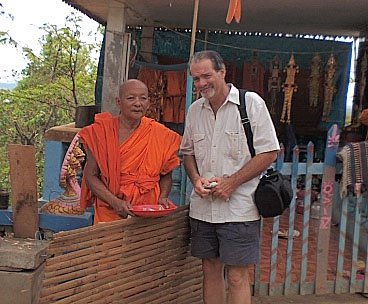Good for the soul
 Robert Macomber with an 80 year old monk at Wat Hanchey during his research in Cambodia
Robert Macomber with an 80 year old monk at Wat Hanchey during his research in CambodiaHistory fascinates me. It always has. So the new fictional novel set in Indochina that I mentioned a couple of days ago has intrigued me. The publishers Pineapple Press are sending me a copy of the book - The Honored Dead - by Robert Macomber, so in the meantime I asked the author for some background to his novel, the 7th in a series of naval historical fiction following the life and career of Lt. Cmdr. Peter Wake from 1863 to 1907, a time when the United States Navy helped America become a global power.
Q. Can you give a short précis of your novel, The Honored Dead?
A. In 1883, American naval intelligence officer Peter Wake is sent to Indochina to present a message from President Chest Arthur to King Norodom I. It should be a simple courier mission and over in a couple of weeks. Six months later, Wake is still in Indochina and has learned that nothing is simple in the Empire of Vietnam and the Kingdom of Cambodia. Along the way, he meets opium warlords, Malay pirates, Catholic priests, French advisors, Vietnamese madarins, and makes a friend in Cambodia's King Norodom, one of the shrewdest and longest reigning monarchs in SE Asia. The story ultimately leads to a significant event of Vietnamese history in August of 1883, after which the French dominated the region.
Q. Why choose Indochina for the 7th novel in the series?
A. In 1883, American naval intelligence officer Peter Wake is sent to Indochina to present a message from President Chest Arthur to King Norodom I. It should be a simple courier mission and over in a couple of weeks. Six months later, Wake is still in Indochina and has learned that nothing is simple in the Empire of Vietnam and the Kingdom of Cambodia. Along the way, he meets opium warlords, Malay pirates, Catholic priests, French advisors, Vietnamese madarins, and makes a friend in Cambodia's King Norodom, one of the shrewdest and longest reigning monarchs in SE Asia. The story ultimately leads to a significant event of Vietnamese history in August of 1883, after which the French dominated the region.
Q. Why choose Indochina for the 7th novel in the series?
A. It is an area which many American readers are familiar with, but might not know the fascinating history. My next novel is set in 1886 Cuba.
Q. Is your character and storyline based on any known historical figure or episode, or purely fictional?
Q. Is your character and storyline based on any known historical figure or episode, or purely fictional?
A. The protagonist is fictional. The event at the end of the story is real. I weave my fictional character into the real event and tell it from his viewpoint.
Q. What will make your book appeal to non-naval readers?
Q. What will make your book appeal to non-naval readers?
A. Though a lot of the story is at sea, it's aboard local vessels - a small steamer and a Vietnamese junk. It's also primarily story about early naval intelligence work and how an American on his first visit to Asia deals with a culture completely alien to him.
Q. When and where did your research take place?
Q. When and where did your research take place?
A. This is a novel, not a dry history book, but I still have to do a lot of learning before I start writing. In my endnotes (I'm one of the few novelists who does endnotes) and acknowledgments my readers can see a lot of my research. I did about five months of research here in the US (reading histories, memoirs, magazine pieces, maps, reports, etc, from the 1880's), then went to SE Asia by ship. I ascended the Mekong by riverboat from Mytho in Vietnam into central, then western Cambodia. I spent time on the Mekong, Tonle and Siem Reap rivers, along with a little time in the capital and at Angkor Wat. In Vietnam, I was on the Saigon, Mekong, and Perfume rivers. Traveling by river gives you a wonderful view of the land, people, and culture. I recommend it to everyone.
Q. You’ve said your trip here has changed you forever – how and why?
Q. You’ve said your trip here has changed you forever – how and why?
A. Frankly, I was surprised the genuine hospitality I found. My expectations of politically dogmatic, sullen, antagonistic people, angry at Westerners because of the historical conflicts, were completely wrong. I fell in love with the very generous people and intricate artistry of the cultures in Vietnam and Cambodia. I want to return and urge everyone to go there. It's good for your soul.
My thanks to Robert Macomber for his speedy response to my questions and for the use of the photo. Visit the author's website here.
Labels: Robert Macomber, The Honored Dead


0 Comments:
Post a Comment
<< Home